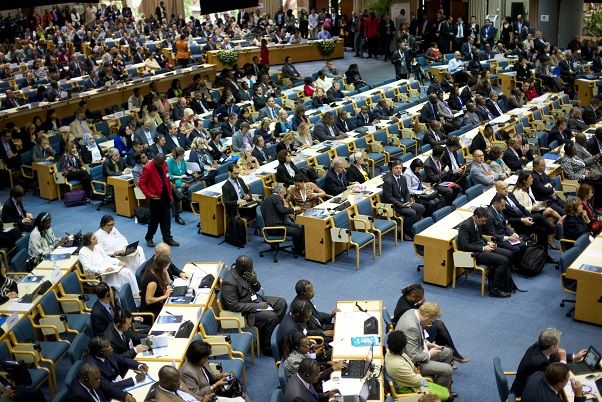Latin American Environment Ministers meet to define regional approach to UN Environment Assembly
Ministers of Environment and representatives of 33 countries of Latin America and the Caribbean will agree this week a set of common actions to achieve the global Sustainable Development Goals

Cartagena de Indias, 30 March 2016 - Ministers of Environment and representatives of 33 countries of Latin America and the Caribbean will agree this week a set of common actions to achieve the global Sustainable Development Goals, including tackling climate change, deforestation and air pollution.
The 20th Meeting of the Forum of Ministers of the Environment of Latin America and the Caribbean comes at a crucial moment as the region determines its climate change and sustainable development priorities ahead of the second UN Environment Assembly (UNEA-2) - the highest-level international decision making body on the environment.
Opening the Forum, Gabriel Vallejo López, Minister of Environment and Sustainable Development of Colombia, said: "This meeting comes at a perfect moment. It coincides with processes of international relevance that give us the opportunity to identify common interests and actions and strategic decisions for the Latin American and Caribbean region.
"The 2030 Agenda is a clear roadmap towards achieving prosperity, peace and inclusion, without disregarding the planet's ecological boundaries - nearly 86 of the 169 targets for the Sustainable Development Goals (SDGs) are related to environmental sustainability."
Rafael Pacchiano, Secretary of the Environment and Natural Resources of Mexico, and Chair of the previous meeting of the Forum of Ministers, said: "Environment and sustainable development are among the most important concepts of public policy at present, because of its cross-cutting nature and because it is related to the very survival of the planet. In this sense our region will continue to promote the balanced integration of economic, social and environmental dimensions."
Delivering on the promise of Paris to limit global warming to 2°C this century will top the ministers' agenda as they address deforestation and the emissions of Short-Lived Climate Pollutants (SLCPs) to fast-track the achievement of their climate pledges.
United Nations Environment Programme (UNEP) Executive Director Achim Steiner said: "When it comes to tackling greenhouse emissions, Latin America and the Caribbean are responsible for less than 10 per cent of the global total, but the region is at the forefront of efforts to tackle them. For example, all of Costa Rica's electricity last year came from renewable sources and all of Brazil and Uruguay's new electricity generation tenders since 2013 have been won by solar and wind technologies.
"When it comes to deforestation, every year the region loses a forest cover equal to 70 per cent of the surface of Costa Rica. Yet Brazil and Costa Rica's re-forestation show that the kind of strategies we see with REDD+ can preserve options for carbon sequestration, healthy livelihoods and sustainable development."
The ministers are also expected to follow up on their ambitious Action Plan to tackle air pollution, adopted at the 19th Forum two years ago. The plan details the climate benefits of improving air quality by reducing the emissions of SLCPs, such as methane and hydrofluorocarbons.
Sponsored Content
A recent report by the World Health Organization (WHO) estimates that each year deaths from non-communicable diseases, mostly attributable to air pollution, amount to up to 8.2 million. Nearly a million premature deaths in the Americas can be linked to environmental factors, most of them to indoor and outdoor air pollution.
The ministers will also discuss South-South cooperation on achieving the 2030 Agenda, protection of biodiversity, and the linkages between health and environment. They are expected to adopt an updated Latin America and the Caribbean Initiative for Sustainable Development, which underscores the need to foster fast, ambitious and integrated action.
The outcomes of the meeting will contribute to UNEA-2, which will be held in Nairobi, Kenya, from 23rd to 27th May 2016 and which will be chaired by a representative of Latin America and the Caribbean region.
For many, the creation of UNEA is the coming of age of the environment as a world issue, as it places environmental concerns on the same footing with those of peace, security, finance, health and trade for the first time. The first UNEA meeting took place in Nairobi in June 2014.
The 20th Meeting of the Forum of Ministers of Environment of Latin America and the Caribbean will conclude on March 31.
For more information please contact María Amparo Lasso, UNEP Regional Communications Officer for Latin America and the Caribbean, maria.lasso@pnuma.org, (+507) 68523459.
About UNEA-2
The United Nations Environment Assembly (UNEA) is the world's most powerful decision-making body on the environment?the de-facto "Parliament for the Environment"?and responsible for tackling some of the most critical issues of our time. The assembly holds the power to dramatically change the fate of the planet and improve the lives of everyone, impacting everything from health to national security, from the plastic in our oceans to the trafficking of wildlife. Thanks to UNEA, the environment is now considered one of the world's most pressing concerns alongside other major global issues such as peace, security, finance and health.
This year, hundreds of key decision makers, businesses and representatives of intergovernmental organizations and civil society will in May gather at UNEA-2, taking place at the United Nations Environment Programme headquarters in Nairobi, for one of the first major meetings since the adoption of the 2030 Agenda for Sustainable Development and the Paris Climate Agreement. The resolutions passed at UNEA-2 will set the stage for early action on implementation of the 2030 Agenda, and drive the world towards a better future, more-just future. UNEA-2 is also inclusive, with myunea.org allowing citizens to feed their concerns into the meeting and take personal ownership of the collective challenges we face.


